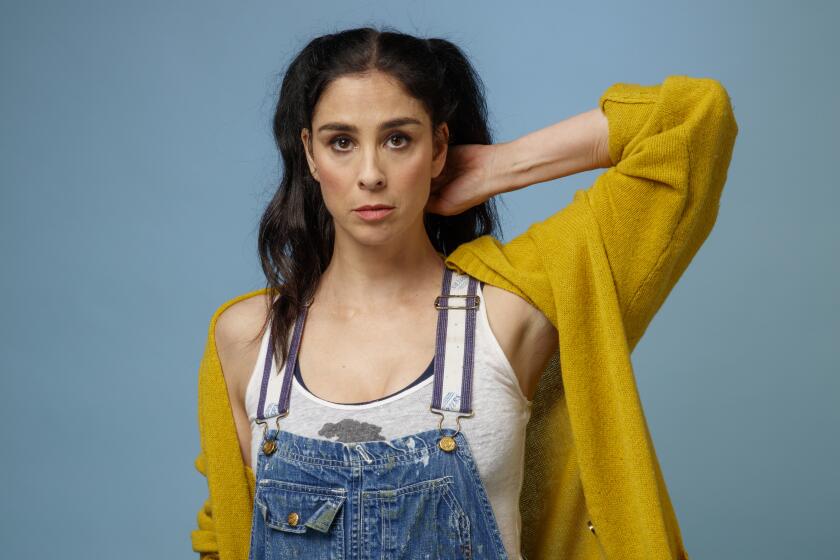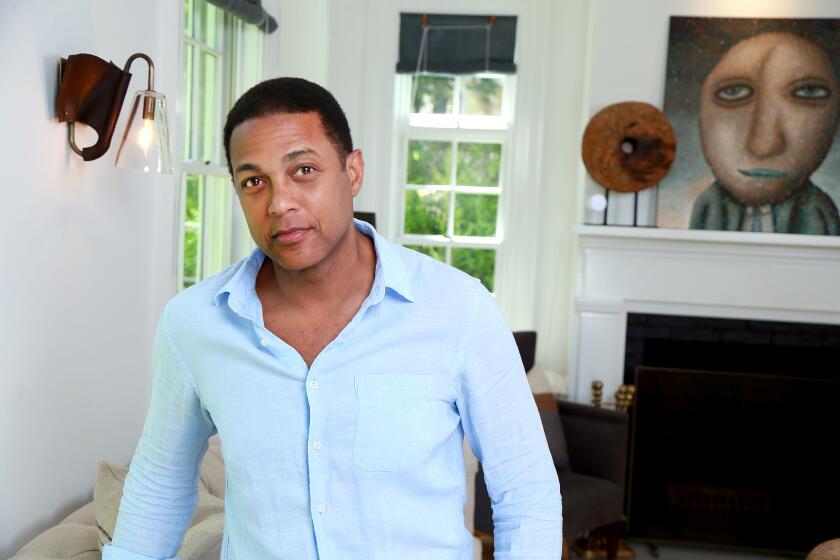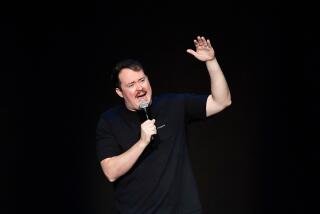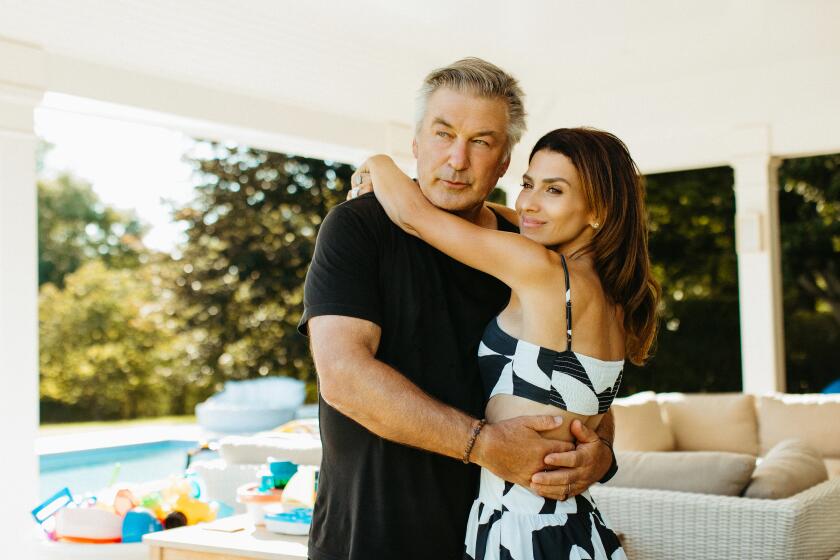Review: Dave Chappelle’s new special isn’t stand-up. It’s an anguished history of violence
- Share via
Dave Chappelle was not funny during his first stage performance in 87 days, an impassioned, 27-minute set that spoke to the cultural reckoning triggered by the killing of George Floyd. But the comedian was in top form.
Chappelle’s special, “8:46” — named for the amount of time a Minneapolis police officer held his knee to Floyd’s neck before Floyd died by asphyxiation — arrived unannounced late Thursday via the Netflix Is a Joke streaming channel on YouTube with nothing more than this short, written intro from the performer: “Normally I wouldn’t show you something so unrefined, I hope you understand.”
For the record:
3:09 p.m. June 12, 2020An earlier version of this story stated that John Crawford III was killed in Colorado. He was killed in Ohio.
What followed was Chappelle at his rawest, which is saying something for a stand-up who’s offended, pissed off and riled up just about every possible corridor of the entertainment and media world over a decades-long career that has included “Chappelle’s Show,” multiple Emmys and Grammys.
But this was a different sort of raw, informed by the heat of moment, decades of injustice and Chappelle’s own need to do something, no matter how underproduced or off-the-cuff.
Sarah Silverman, host of the Emmy-nominated variety sketch series “I Love You, America,” calls “cancel culture” a “mutated” form of McCarthyism.
He talked about the tape of Floyd’s murder, the hubris of cops who had their hands in their pockets as Floyd, calling for his dead mother, was being choked to death. From there Chappelle tackled the bravery and leadership of protesters, and ripped on CNN anchor Don Lemon’s call for celebrities to step up: “[He] expects me to step in front of the streets and talk over the work these [protesters] are doing ... as a celebrity?” asked Chappelle. “Answer me: Do you want to see a celebrity right now? Do we give a ... what Ja Rule thinks? No!”
He went as far back as his great-great-grandfather, AME bishop William David Chappelle, a former slave who led one of the first African American delegations to the White House to protest the lynching of a Black man. He brought the history up to the murders of Trayvon Martin, Michael Brown and Eric Garner. Chappelle also targeted the Fox-branded racism of Laura “Shut Up and Dribble” Ingraham.
The performer took the outdoor stage in sweats, a book of notes in one hand, a plastic cup in the other. The masked audience sat in socially distanced folding chairs after undergoing temperature checks to attend the small event, which was recorded on June 6, in an outdoor performance space in Ohio.
Chappelle was nervous when first addressing the gathering from the rustic, wooden stage, admitting it was a weird time to put on a show, but the only way to see if it would work is to “do the goddamn show.”
He started by giving a shout-out “to all the young people who went out protesting.” “I’m proud of you,” he said. “You are excellent drivers and I’m comfortable in the backseat of the car. So carry on, young ones.”
He then opened his notebook, looking for where to start: “It’s hard to figure out what to say about George Floyd, so I’m not gonna say it yet. I, uh …” he sighed, and closed the book.
Then the real conversation began, because what happened wasn’t a show. It was someone in pain, reconciling his anguish, exasperation and anger in a monologue, speaking to what he could in the moment.
He recalled experiencing the huge Northridge earthquake in Los Angeles in 1994, certain that he might die. “I remember telling myself not to scream,” he said. “So just in case I lived I would not remember myself being vocally terrified. That earthquake couldn’t have been more than 35 seconds. … This [cop] kneeled on a man’s neck for 8 minutes and 46 seconds. Can you imagine that?! … [Floyd] knew he was gonna die. He called for his mother. He called for his dead mother. I’ve only seen that once in my life. My father, on his deathbed, called for his grandmother. When I watched that [Floyd] tape, I understood this man knew he was gonna die.”
“I’m gonna get heavy,” he continued. “But we gotta say something.”
The Louisiana native, who joined CNN in 2006 and is the only Black cable news anchor in prime time, is clearly energized by having a role in shaping the current national discourse on race relations.
The audience was silent, but it wasn’t the quiet of an indifferent comedy crowd. They were right there with Chappelle, willing to go down a hard road rather than seek laughs. And so apparently are the millions who have since discovered the stream.
When he lamented Lemon asking where all the celebrities were, Chappelle explained that he’d been talking about race for years onstage. And right now he figured the only reason “you want to hear from people like me is that I don’t lie to you. I’m just a guy. And every institution that we trust lies to us.”
He never did look at his book of notes. Ten minutes in, he put it down altogether. The cigarette in his hand he kept trying to light stayed unsmoked for most of the set. Chappelle may have been winging much of what he said, but he was focused.
He recalled the story of Christopher Dorner, a Black LAPD officer who was fired after he turned in a fellow cop for using force. (The LAPD alleged, against Dorner’s protests to the contrary, that he had fabricated the story; a 2013 LAPD report determined that Dorner’s dismissal was justified.) He released a manifesto about seeking revenge on the LAPD and carried through with his threat in 2013, killing law enforcement and their family members in a series of attacks until he was apprehended and killed in a massive manhunt. Chappelle’s mention of Dorner seemed irrelevant save for him being mentioned in the manifesto, but it was not. Read on.
Chappelle recalled the names of so many of those Black men who’d been killed: “Eric Garner in New York, the first guy that told the police, ‘I can’t breathe.’ He was selling loose cigarettes in Staten Island when my first son was born. … Staten Island is a terrible place. [Expletive] everyone in Staten Island except the Wu-Tang Clan. He got murdered by one policeman while five of his fellow officers watched him do it.” A quick clip of Garner’s arrest was shown. “And there goes Eric Garner,” said Chappelle. “And then we have one after another.”
He reeled off the names: Trayvon Martin. The congregation of the Charleston, S.C., church killed by white supremacist Dylann Roof. The police murder of John Crawford III in Ohio . Michael Brown the same week. Philando Castile in Minnesota.
“Am I boring you?,” asked Chappelle. No. The audience was with him, as you will be when you watch this.
Then nine cops are murdered in Dallas at a Black Lives Matter rally, he said. “The guy that killed those cops was, like Chris Dorner, from the … military. Right after he did it, another four cops were shot dead in Baton Rouge, La. by a Black man that served in our military. Why would Black men from the military do that? Because they believe, just like they did when they joined the military, that they are fighting acts of terror.” (In fact, five officers were killed and nine were injured in Dallas, and three were killed in Baton Rouge.)
Chappelle then went after conservative commentator Candace Owens, who chastised the Black community for making Floyd, whom she described as a criminal, into a hero. “We didn’t choose him, you did,” said Chappelle. “They killed him, and that wasn’t right, so he’s the guy. We’re not desperate for heroes in the Black community. Anyone that survives this nightmare is my goddamn hero.”
The set was intense, and Chapelle recognized it. “This is not funny at all,” he said. “I got some [sex] jokes I can do too, but I really just …” He took a deep breath, and a drag off his cigarette. This set required breaks.
The only reason those police in Dallas getting shot wasn’t the end of the world, said Chappelle, is “because at the same exact time it was happening, Kobe Bryant was playing his last game as a L.A. Laker. As scary as all that ... was, I kept flipping back to see if Kobe would drop 60. And he did. Oh, and he did. Then vaguely in my mind I remember that idiot [Ingraham] … telling somebody to shut up and dribble, and I watched [Kobe] dribbling, and saving this goddamn country from itself.”
As he recalled his great-great-grandfather, who joined other formerly enslaved people to lobby Woodrow Wilson, and connected that act with the mass activism that has followed Floyd’s death, Chappelle said, “They were slaves. … and [people such as Lemon] are asking, ‘Why isn’t Dave Chappelle saying anything?’ Because Dave Chappelle understands what … he is seeing, and these streets will speak for themselves.”
More to Read
Updates
6:28 p.m. June 14, 2020: The following story has been updated to clarify the details of several cases cited by Chappelle in “8:46.”
The complete guide to home viewing
Get Screen Gab for everything about the TV shows and streaming movies everyone’s talking about.
You may occasionally receive promotional content from the Los Angeles Times.









